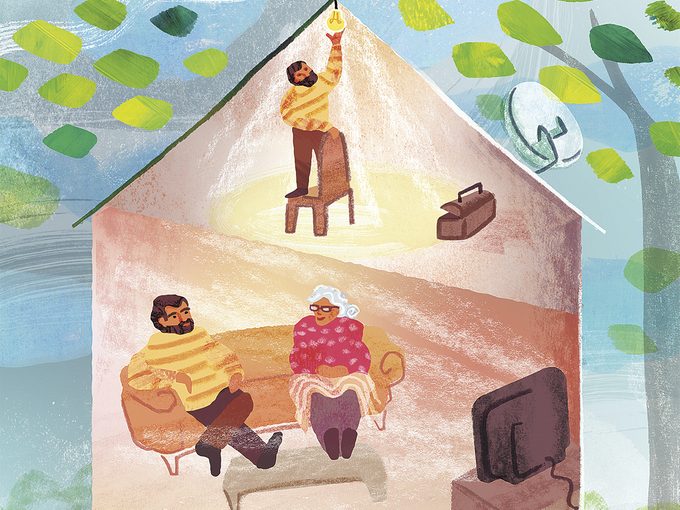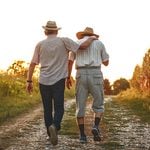How My Mom and I Moved Past Our Clashing Personalities and Reconnected
Mom and I agreed long ago that our differences would always present challenges. But during the first lockdown of the pandemic, we finally learned how to get along again.

Last spring, when the first lockdown began in Winnipeg, the task to check in daily on our elderly mother fell to me. I was no longer working in an office, and since I lived alone, I could more easily limit social contacts and ensure her safety.
My brother and sister-in-law handled the weekly grocery shopping (dropped off at the side door) as well as Mom’s monthly haircut (with her seated smack in the centre of the backyard on a white-gone-grey plastic lawn chair).
Mom is 88 and lives on her own in the home she and my father moved into after their retirement. Dad passed away about 12 years ago—he fell ill just as my parents were about to celebrate their 50th anniversary.
She’s blessed, of course, to have her two sons and three grandchildren nearby, and my brother and I are lucky even to have been able to visit her. Still, I wasn’t sure how the visits would go. Mom and I agreed long ago that we have clashing personalities and, even as I’ve crossed into my late 50s, our differences still present challenges. She appreciates discipline and order; I favour improvisation. We do share a facility with language—but, unfortunately, when directed at each other, it can be biting.
Initially, I timed my visits to coincide with the Greek game shows she watches every afternoon on satellite TV. The ice-breaker worked: soon we found ourselves rooting for the same contestants or comparing the relative appeal of the various hosts.
Mom became fascinated with my ability to find out trivial information almost instantly on my smart phone: the age of a Greek pop singer, the selling price of the house down the street, the year an acquaintance married.
“How can that little thing know so much?”
What I discovered when we turned away from the TV, however, was that my mother knew things Google didn’t. Soon I set aside my phone and made Mom my preferred search engine. I learned, for instance, that the German soldiers occupying her hometown south of Sparta during the Second World War sunbathed in the nude every afternoon, and that the trick to cooking wild dandelion greens so they are only slightly tart and still deliciously tender is not to over-boil them.
My mother also revealed family histories I wasn’t aware of: that as a child she enjoyed climbing trees and throwing stones; that in 1934 my paternal grandparents lost their twins—two boys not yet six months old—on consecutive days to a mysterious “grippe” virus; that my mother had only ever seen snow once before coming to Canada; and that my father, in their first years of marriage, had earned her lifelong loyalty by agreeing without argument to pay for her own mother’s new dentures.
I was hooked. Soon I was visiting twice a day.
On about Day 12 of that initial lockdown, Mom’s landline went dead. I called the phone company and learned the problem could last as long as a week. The customer service rep was surprised Mom didn’t own a cellphone and recommended we buy one for her to tide her over.
“We’ll call the television news,” I joked to mom, “and invite them to interview the octogenarian learning to use a cellphone for the first time.”
Mom wasn’t amused. We nixed the cellphone idea. But now the issue remained of how she would contact anyone in the event she needed help. We decided it was best if I slept over until the landline was repaired. I packed my overnight bag.
“I get up a few times a night, I’m just warning you,” she told me.
“It’s okay,” I replied. “So do I.”
She laughed: “I guess so. I’m only 30 years older than you.”
The week living together went surprisingly well. Never a handyman, I nevertheless tried my best to make myself useful. I changed a light bulb, found a discarded piece of baseboard with which she could easily switch the television on and off, and took her reading glasses in for repair when the toothpick I tried as a temporary fix to replace a screw didn’t quite do the trick.
When we weren’t addressing the long list of deferred household maintenance chores, we planned the day’s menu, went for walks down the street and continued our open-ended chats.
One night at bedtime, which was signaled on weekdays by the 9:00 p.m. closing credits of the Seattle broadcast of Wheel of Fortune, she turned to me and said: “Now I’ve learned your character.”
I didn’t ask her to elaborate. But, choosing to interpret the gleam in her eye as an indication that her conclusion was a favourable one, I found myself struggling to keep from choking up.
One afternoon well into the second month, after the phone was working again, I called Mom to let her know I was coming by. No answer. I dismissed any negative thoughts. I drove over and knocked at the door. Again, no answer. Now I was getting worried. I called my brother and the friend down the back lane my mother often visited pre-pandemic. Neither had heard from her that morning. I retrieved the extra set of house keys from my car and let myself in. My heart thumped. I checked the upstairs rooms, the basement. No Mom. I realized I hadn’t checked the bathtub. I steeled myself for the worst, pulling the shower curtain aside.
Nothing.
I got into my car and headed down the street. Maybe she’d taken a walk. I spotted a police cruiser parked outside a fast food outlet. The officers might have spotted her somewhere, or at least I could report her as a missing person, I decided.
As I swung into the strip mall parking lot, there was Mom walking down the adjacent sidewalk, sunglasses shading her eyes, a grocery bag hanging at her side.
I was too relieved to chastise.
“I’ll drive you home,” I offered.
“I’m fine, thanks,” she said. “I just needed to do something myself.”
I smiled. “I was ready to have the police track you down.”
“Don’t worry,” she said. “It won’t happen again. I don’t like all the new rules. The cashier scolded me for resting my purse on the checkout counter.”
Now, over a year after our lockdown journey began, the pandemic hasn’t given up. But neither has Mom. The winter months were the hardest, forcing her to remain indoors more than she’d have liked. Her spirit, though, remained as indomitable as ever.
The year has not been without loss, however. At least a dozen of Mom’s friends have died, and so has one of my own.
“The shovels, the spades and straight to Hades,” my mother intoned recently in rhyming Greek, calling up one of the countless Old World aphorisms in her repertoire. I guess when you’ve lived almost 90 years, you come to realize that the end of life is always near.
In the meantime, Mom is eagerly anticipating her COVID-19 vaccine. And like so many other grandparents, she’s looking forward to safely hosting her grandchildren again. There’s even phyllo pastry waiting in the freezer for the day she can bake a spanakopita for us all.
Physical distancing measures notwithstanding, my generation fully expects to visit our parents as they are dying, usually in hospital; I’ve learned that the real reward comes in visiting them as they are living.
With at least some level of pandemic restrictions still in place, my sessions with Mom have become the highlight of my day. Some days I drop by as many as three times.
I like to believe the time spent with her is good for my character.
Next, read the heartwarming story of how casserole brought this family together during the pandemic.
© 2020, John Danakas. From “In Lockdown, Mom and I Are Learning to Reconnect,” The Globe and Mail (November 22, 2020), theglobeandmail.com



